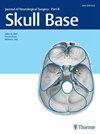Neurocognitive Functioning of Patients with Sinonasal and Nasopharyngeal Cancers Treated With Multimodality Therapy
IF 0.9
4区 医学
Q3 Medicine
引用次数: 0
Abstract
Abstract Importance Few recent studies have examined neurocognitive functioning (NCF) in patients with sinonasal and nasopharyngeal cancers (NPCs) prior to and following multimodality therapy or the potential differences in NCF by disease variables such as disease site. Objective The objective of this study is to determine rates of NCF impairments prior to and following multimodality therapy, declines in NCF following radiotherapy (RT), and possible differences in NCF by the disease site. Design, Setting, and Participants We conducted a retrospective chart review of 39 patients with sinonasal and NPCs who underwent comprehensive neuropsychological evaluations. Twenty patients were evaluated prior to RT, of which eleven received follow-up evaluation after completion of RT. Nineteen patients were evaluated following various treatments without a pre-RT evaluation. Main Outcomes and Measures Patients completed comprehensive neuropsychological evaluations. Decline from pre-RT to follow-up was defined on the basis of reliable change indices. Results Thirty-nine patients completed comprehensive neuropsychological evaluations. For the entire cohort, the most frequently demonstrated impairments were in verbal memory (47%) and learning (43%), executive functioning (33%), and verbal fluency (22%). At post-RT follow-up, the most frequently observed declines were in verbal learning (46%) and memory (18%). Demographic and disease variables were not significantly associated with NCF at pre-RT or post-RT. Conclusion and Relevance Patients with sinonasal and NPCs are at risk for NCF impairments in multiple areas at baseline and memory decline following RT. Future prospective studies are needed to investigate the impact of each treatment modality on NCF and specific risk factors for cognitive dysfunction.多模式治疗鼻窦癌和鼻咽癌患者的神经认知功能
摘要:最近很少有研究研究多模式治疗前后鼻窦和鼻咽癌(npc)患者的神经认知功能(NCF),或疾病部位等疾病变量对NCF的潜在差异。目的本研究的目的是确定多模式治疗前后NCF损伤的发生率,放疗后NCF的下降,以及不同疾病部位NCF的可能差异。设计、环境和参与者我们对39例鼻窦和鼻窦炎患者进行了回顾性的图表回顾,他们接受了全面的神经心理学评估。20例患者在放疗前接受评估,其中11例患者在放疗完成后接受随访评估。19例患者在接受各种治疗后接受评估,未进行放疗前评估。主要观察结果和测量方法患者完成了全面的神经心理学评估。根据可靠的变化指标定义从术前到随访的下降。结果39例患者完成了综合神经心理评估。在整个队列中,最常见的障碍是言语记忆(47%)和学习(43%),执行功能(33%)和语言流畅性(22%)。在rt后的随访中,最常观察到的下降是语言学习(46%)和记忆(18%)。在放疗前或放疗后,人口统计学和疾病变量与NCF无显著相关。结论及相关性鼻窦和鼻咽癌患者在基线时存在多区域NCF损伤和rt后记忆力下降的风险。需要进一步的前瞻性研究来研究每种治疗方式对NCF的影响以及认知功能障碍的具体危险因素。
本文章由计算机程序翻译,如有差异,请以英文原文为准。
求助全文
约1分钟内获得全文
求助全文
来源期刊

Journal of Neurological Surgery Part B: Skull Base
CLINICAL NEUROLOGY-SURGERY
CiteScore
2.20
自引率
0.00%
发文量
516
期刊介绍:
The Journal of Neurological Surgery Part B: Skull Base (JNLS B) is a major publication from the world''s leading publisher in neurosurgery. JNLS B currently serves as the official organ of several national and international neurosurgery and skull base societies.
JNLS B is a peer-reviewed journal publishing original research, review articles, and technical notes covering all aspects of neurological surgery. The focus of JNLS B includes microsurgery as well as the latest minimally invasive techniques, such as stereotactic-guided surgery, endoscopy, and endovascular procedures. JNLS B is devoted to the techniques and procedures of skull base surgery.
 求助内容:
求助内容: 应助结果提醒方式:
应助结果提醒方式:


